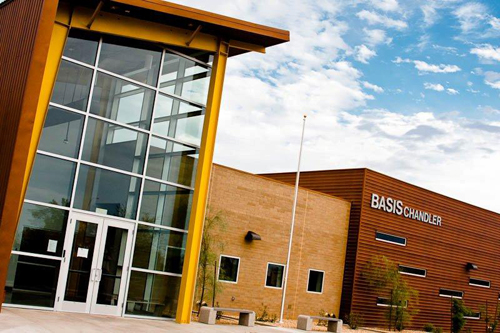
The co-founders of BASIS Schools, Michael and Olga Block, aimed to offer the type of education students receive in the top performing education systems around the world, the type of education that would help American students compete in the global economy.
Ten years after BASIS Schools opened its first campus in Tucson, Αριζόνα, the school topped the national rankings, earning the #1 spot on Newsweek’s list of America’s Best High Schools, and was named a gold medal school by Η.Π.Α.. Νέα & World Report. In addition to BASIS Tucson, today there are a total of 6 operating BASIS charter schools, including BASIS Scottsdale (2003), BASIS Oro Valley (2010), BASIS Chandler (2011), BASIS Peoria (2011), and BASIS Flagstaff (2011). There have been more awards and there are more schools on the way, including BASIS Phoenix (2012), BASIS Tucson North (2012), and BASIS DC (TBA).
What can the rest of the world learn from the BASIS Schools model?
I had the pleasure of chatting with Michael Block, Co-CEO of BASIS Educational Group. Ο Δρ. Block received his B.A., M.A., and Ph.D. in Economics from Stanford University. Prior to BASIS, he was a Professor of Economics, Professor of Law and Director of the Office of Economic Education at the University of Arizona.
Can the BASIS Schools model be replicated across the nation?
We are expanding our model and opening BASIS schools in more locations. We have about 4,000 students attending six BASIS schools this year. Next year our programs may reach approximately 6,000 φοιτητές. This is still very limited reach when considering the millions of students receiving mediocre education across the US. The bigger issue might be ‘what is there to learn from the BASIS model?’ There are three points I think can be transferred in some manner.
Πρώτα, we have implemented very high academic standards that are internationally competitive and higher than any American state’s requirements. We also require students to demonstrate mastery of those standards before they can progress to the next grade. Στις ΗΠΑ, not only are standards abysmally low, but the tests used to examine students’ mastery of the standards are often poorly designed and unrelated to the content taught in school. Systems used around the world, such as the Cambridge International Exams, Εξετάσεις Προηγμένη τοποθέτηση της Ακαδημίας συμβουλίου, το Πρόγραμμα Διεθνούς Αξιολόγησης Μαθητών, και άλλοι, can assess mastery of high-level content. That is something I think we do well at BASIS – διδάσκουμε με πολύ υψηλές προδιαγραφές και, στη συνέχεια, αξιολόγηση των μαθητών μας’ πρόοδος προς την επίτευξη αυτών των προτύπων με τη χρήση διεθνώς αναγνωρισμένων αξιολογήσεις.
The second point is much more controversial. At BASIS we focus first and foremost on recruiting, μίσθωση, και διατηρώντας τους εκπαιδευτικούς οι οποίοι είναι ειδικοί στο αντικείμενο που διδάσκουν. Whether or not the individual is certified to teach by the government or graduated from a school of education – ο οποίος, στις Η.Π.Α, is not often the most distinguished academic institution – is of secondary importance. We believe it is critical that teachers possess a thorough knowledge of the material they present to their students and we believe it is more effective for subject experts to learn the craft of teaching than for pedagogical experts to learn the subject content they may be lacking. Στο ΒΑΣΗ, we have teachers in our classrooms starting in the Lower School grades that are subject experts; many possess masters and doctoral degrees.
Τελικά, Americans seem to have given up on teaching rigorous content in middle school. BASIS demonstrates that you can teach serious subject content in these grade levels. Επιτρέψτε μου να σας δώσω ένα παράδειγμα. We visited one of the great schools in America, Thomas Jefferson High School for Science and Technology in the suburbs of Virginia, and were incredibly impressed with the level of education the school imparts on its students. Thomas Jefferson utilizes a selective admissions process to enroll students who are prepared for their rigorous curriculum, but at BASIS we offer a similarly rigorous education to all students who wish to enroll. We are only able to do this because of our accelerated middle school curriculum. By starting at a modest 5th grade level and requiring students to learn more than a year’s worth of standards every year, έχουμε προετοιμάσει τους μαθητές να λάβουν Διακρίσεις και AP μαθήματα αρχίζουν στις 9η τάξη και μετα-AP μαθήματα στην 11η ή 12η τάξη, ακριβώς όπως και οι συνομήλικές τους στο Thomas Jefferson.

Are the BASIS schools for highly motivated students in certain subject areas only?
Μη, the BASIS education is not focused on certain subject areas. We offer an accelerated program in all core subjects; ωστόσο, in contemporary America it seems schools that provide high-quality math and science education are pigeonholed. Στο ΒΑΣΗ, όλοι οι μαθητές πλήρης προ-λογισμός και να AP-επίπεδο μαθημάτων επιστήμης στην 9η τάξη; σαν άποτέλεσμα, BASIS is sometimes considered a math and science school. But while our students do outpace their peers in math and science, they also complete a minimum of one AP English and three AP history courses by the end of 11th grade, engage in six years of foreign language, take a college-level economics course in 8th grade, and participate in PE and fine arts classes throughout their academic careers. The BASIS education is much like the gymnasiums in central Europe; we offer a high quality education in all of the liberal arts.
Is the school only for highly motivated students?
Students don’t have to be “gifted” to excel in the BASIS program, but they do have to put in effort. We work very hard to create a culture of academic excellence in our schools. We hire educators who can convey passion for their subject in a way that teaches students that learning is exciting. As older students build a sense of personal responsibility for their education, they become models for younger students and create a culture of positive peer pressure. This culture motivates students to excel in their academic exploration and teaches them that success is the function of hard work.
What is your process for selecting a great teacher?
Finding talent is tough. We try to have a very broad base of candidates from which we select our teachers and often search worldwide to fill math and science positions. Our interviews are conducted first by veteran BASIS teachers and then by the Head of School. The candidates then participate in demonstration lessons – in which they teach current BASIS students for two class periods – which I think is unusual in public schools. This allows us to determine whether the candidate is capable of conveying advanced concepts to young students. We have the most senior staff members at BASIS do the final round of interviews before making a decision.
After our teachers are hired, we have a summer training session which all new teachers and many experienced teachers attend. The training session exposes new teachers to the BASIS philosophy and focuses on the teaching techniques used in many of our classrooms. Τελικά, we try to mentor teachers as they begin their careers at BASIS. We spend a good deal of time with them. The process of finding and developing teaching talent is difficult and of course we make our share of mistakes.
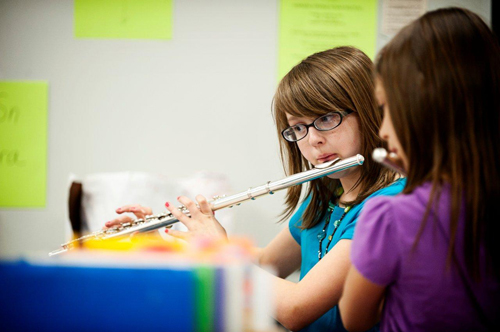
Why do we do so poorly in the PISA test?
PISA tests what an education system teaches its 15-year-old students, and in the United States we don’t teach math and science well in middle and high school. Many 10th graders in the US have not been exposed to the concepts of an Algebra 2 course and in a many states students can graduate without taking Physics. I think that is inexcusable.
Πιστεύω επίσης ότι το εκπαιδευτικό σύστημα των ΗΠΑ επικεντρώνεται πάρα πολύ προσοχή στις εισροές, όπως την πιστοποίηση των εκπαιδευτικών, μέγεθος της τάξης, αναλογία φοιτητών-καθηγητών, διάρκεια της ημέρας και τη σχολική χρονιά, η μορφή των συμπληρωματικών υπηρεσιών, η φυσική φυτό, και της τεχνολογίας στην τάξη, και πολύ λίγη προσοχή στις εξόδους, όπως το πόσο καλά οι μαθητές είναι σε θέση να ελέγξουν σημαντικό ακαδημαϊκό περιεχόμενο. Εστιάζοντας στις εισροές είναι αντιπερισπασμού και μέσα εκπαιδευτικούς και διευθυντές των σχολείων έχουν λιγότερο χρόνο για να αξιολογήσει και να βελτιώσει την ποιότητα της εκπαίδευσης που παρέχουν.
Final thoughts on the education reform issues we face in the US today?
There is one more issue I want to mention that I think BASIS is designed to get at. There are two achievement gaps in the US. The achievement gap that receives almost all the attention in the media – which is real and shameful – is the achievement gap between rural areas and the poorer sections of major cities on one hand and the suburbs across the country on the other. Another much more hidden achievement gap is the international achievement gap. What US suburbanites consider a “καλή εκπαίδευση” is actually mediocre by international standards. That’s an important aspect of the BASIS experiment – our academic program addresses the international achievement gap that exists between the United States and other industrialized countries.
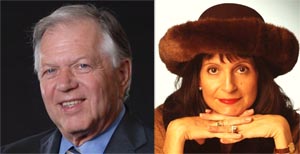
Photos courtesy of BASIS Schools, Inc.
Σε Η Σφαιρική Αναζήτηση για Εκπαίδευση, μαζί μου και παγκοσμίως γνωστή ηγέτες σκέψης συμπεριλαμβανομένου του Sir Michael Κομμωτήριο (Ηνωμένο Βασίλειο), Ο Δρ. Michael Block (ΗΠΑ), Ο Δρ. Leon Botstein (ΗΠΑ), Ο Δρ. Linda Ντάρλινγκ-Hammond (ΗΠΑ), Ο Δρ. Madhav Chavan (Ινδία), Ο καθηγητής Michael Fullan (Καναδάς), Ο καθηγητής Howard Gardner (ΗΠΑ), Ο καθηγητής Yvonne Hellman (Η Ολλανδία), Ο καθηγητής Kristin Helstad (Νορβηγία), Jean Hendrickson (ΗΠΑ), Καθηγητής Rose Hipkins (Νέα Ζηλανδία), Καθηγητής Cornelia Hoogland (Καναδάς), Η κ. Chantal Kaufmann (Βέλγιο), Ο καθηγητής Dominique Λαφοντέν (Βέλγιο), Ο καθηγητής Hugh Lauder (Ηνωμένο Βασίλειο), Καθηγητής Ben Levin (Καναδάς), Καθηγητής Barry McGaw (Αυστραλία), Καθηγητής R. Natarajan (Ινδία), Ο Δρ. Denise Πάπα (ΗΠΑ), Sridhar Rajagopalan (Ινδία), Ο Δρ. Diane Ravitch (ΗΠΑ), Sir Ken Robinson (Ηνωμένο Βασίλειο), Καθηγητής Pasi Sahlberg (Φινλανδία), Andreas Schleicher (PISA, ΟΟΣΑ), Ο Δρ. Anthony Seldon, Ο Δρ. David Shaffer (ΗΠΑ), Ο Δρ. Kirsten Μοναδική Are (Νορβηγία), Στήβεν Spahn (ΗΠΑ), Yves Theze (Γαλλικό λύκειο των ΗΠΑ), Ο καθηγητής Charles Ungerleider (Καναδάς), Ο καθηγητής Tony Wagner (ΗΠΑ), Καθηγητής Dylan Γουίλιαμ (Ηνωμένο Βασίλειο), Ο Δρ. Mark Wormald (Ηνωμένο Βασίλειο), Ο καθηγητής Theo Wubbels (Η Ολλανδία), Ο καθηγητής Michael Young (Ηνωμένο Βασίλειο), και ο καθηγητής Minxuan Zhang (Κίνα) καθώς εξερευνούν τα μεγάλα ζητήματα της εκπαίδευσης εικόνα που όλα τα έθνη αντιμετωπίζουν σήμερα. Η Παγκόσμια αναζήτηση για την Εκπαίδευση της Κοινότητας Σελίδα
C. M. Rubin είναι ο συγγραφέας του ευρέως διαβάσετε online σειρά, Η Σφαιρική Αναζήτηση για Εκπαίδευση, και είναι επίσης ο συγγραφέας τριών βιβλίων με εμπορική επιτυχία, Συμπεριλαμβανομένων Η Ρεάλ Αλίκη στη Χώρα των Θαυμάτων.



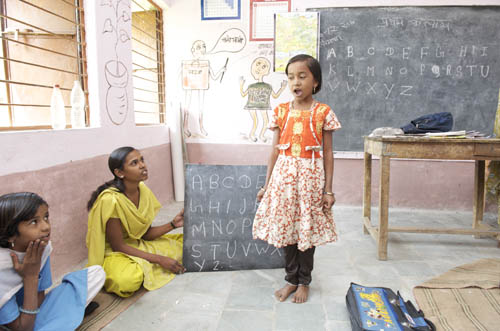
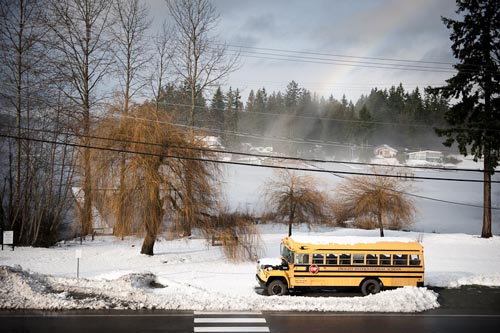

Πρόσφατα σχόλια